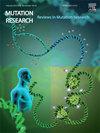DGKβ accelerates the progression of cervical cancer through ANGPT4-mediated tumor angiogenesis
IF 1.9
4区 医学
Q4 BIOTECHNOLOGY & APPLIED MICROBIOLOGY
Mutation Research-Fundamental and Molecular Mechanisms of Mutagenesis
Pub Date : 2025-07-01
DOI:10.1016/j.mrfmmm.2025.111913
引用次数: 0
Abstract
Background
Cervical cancer (CC) is a major cause of morbidity and mortality in women, with complex etiology and progression. Diacylglycerol kinases (DGKs) are pivotal in lipid metabolism. Although diacylglycerol kinase beta (DGKβ) is well-studied in neurology, its role in cancer, especially CC, remains underexplored. This study aimed to explore DGKβ's role and mechanism in CC.
Methods
Bioinformatics analysis was employed to identify genes differentially expressed in CC, with western blot confirming DGKβ expression in CC cells. The role of DGKβ was examined through small interfering RNA-mediated gene silencing, proliferation tests, migration and invasion assays, and angiogenesis studies. In-depth bioinformatics explored DGKβ-regulated downstream targets and pathways. Pathological assessment elucidated the impact of DGKβ and angiopoietin 4 (ANGPT4) on CC samples.
Results
Our data identified DGKβ as a promising candidate gene in the context of CC. This conclusion stemmed from the notable observation that DGKβ exhibited a heightened expression in CC cell lines. Notably, the silencing of DGKβ resulted in the suppression of CC cell proliferation, invasion, migration, as well as the epithelial-mesenchymal transition processes. Additional bioinformatics analysis delving into DGKβ-associated genes revealed ANGPT4 as a downstream target gene of DGKβ, which is capable of modulating angiogenesis and possesses multiple cellular functions related to cell survival, proliferation, and migration. Most significantly, our findings also demonstrated that both DGKβ and ANGPT4 were overexpressed in clinical specimens of CC.
Conclusion
This study uncovered an oncogenic role for DGKβ in CC and identified a potential regulatory link between DGKβ and ANGPT4 in tumor angiogenesis. These findings provided promising directions for developing new diagnostic and therapeutic approaches for CC.
DGKβ通过angpt4介导的肿瘤血管生成加速宫颈癌的进展
宫颈癌(CC)是女性发病和死亡的主要原因,其病因和进展复杂。二酰基甘油激酶(DGKs)在脂质代谢中起关键作用。尽管二酰基甘油激酶β (DGKβ)在神经学中得到了很好的研究,但其在癌症,特别是CC中的作用仍未得到充分研究。目的探讨DGKβ在CC中的作用及机制。方法采用生物信息学方法鉴定CC细胞中DGKβ的差异表达基因,western blot证实DGKβ在CC细胞中的表达。DGKβ的作用通过小干扰rna介导的基因沉默、增殖试验、迁移和侵袭试验以及血管生成研究来检测。深入的生物信息学探索dgk β调控的下游靶点和途径。病理评估阐明DGKβ和血管生成素4 (ANGPT4)对CC样品的影响。结果DGKβ在CC细胞系中表达增高,这一结论来源于DGKβ在CC细胞系中的显著表达。值得注意的是,DGKβ的沉默导致CC细胞增殖、侵袭、迁移以及上皮-间质转化过程的抑制。进一步深入DGKβ相关基因的生物信息学分析表明,ANGPT4是DGKβ的下游靶基因,能够调节血管生成,并具有与细胞存活、增殖和迁移相关的多种细胞功能。最重要的是,我们的研究结果还表明DGKβ和ANGPT4在CC的临床标本中都过表达。结论本研究揭示了DGKβ在CC中的致癌作用,并确定了DGKβ和ANGPT4在肿瘤血管生成中的潜在调节联系。这些发现为开发新的CC诊断和治疗方法提供了有希望的方向。
本文章由计算机程序翻译,如有差异,请以英文原文为准。
求助全文
约1分钟内获得全文
求助全文
来源期刊
CiteScore
4.90
自引率
0.00%
发文量
24
审稿时长
51 days
期刊介绍:
Mutation Research (MR) provides a platform for publishing all aspects of DNA mutations and epimutations, from basic evolutionary aspects to translational applications in genetic and epigenetic diagnostics and therapy. Mutations are defined as all possible alterations in DNA sequence and sequence organization, from point mutations to genome structural variation, chromosomal aberrations and aneuploidy. Epimutations are defined as alterations in the epigenome, i.e., changes in DNA methylation, histone modification and small regulatory RNAs.
MR publishes articles in the following areas:
Of special interest are basic mechanisms through which DNA damage and mutations impact development and differentiation, stem cell biology and cell fate in general, including various forms of cell death and cellular senescence.
The study of genome instability in human molecular epidemiology and in relation to complex phenotypes, such as human disease, is considered a growing area of importance.
Mechanisms of (epi)mutation induction, for example, during DNA repair, replication or recombination; novel methods of (epi)mutation detection, with a focus on ultra-high-throughput sequencing.
Landscape of somatic mutations and epimutations in cancer and aging.
Role of de novo mutations in human disease and aging; mutations in population genomics.
Interactions between mutations and epimutations.
The role of epimutations in chromatin structure and function.
Mitochondrial DNA mutations and their consequences in terms of human disease and aging.
Novel ways to generate mutations and epimutations in cell lines and animal models.

 求助内容:
求助内容: 应助结果提醒方式:
应助结果提醒方式:


